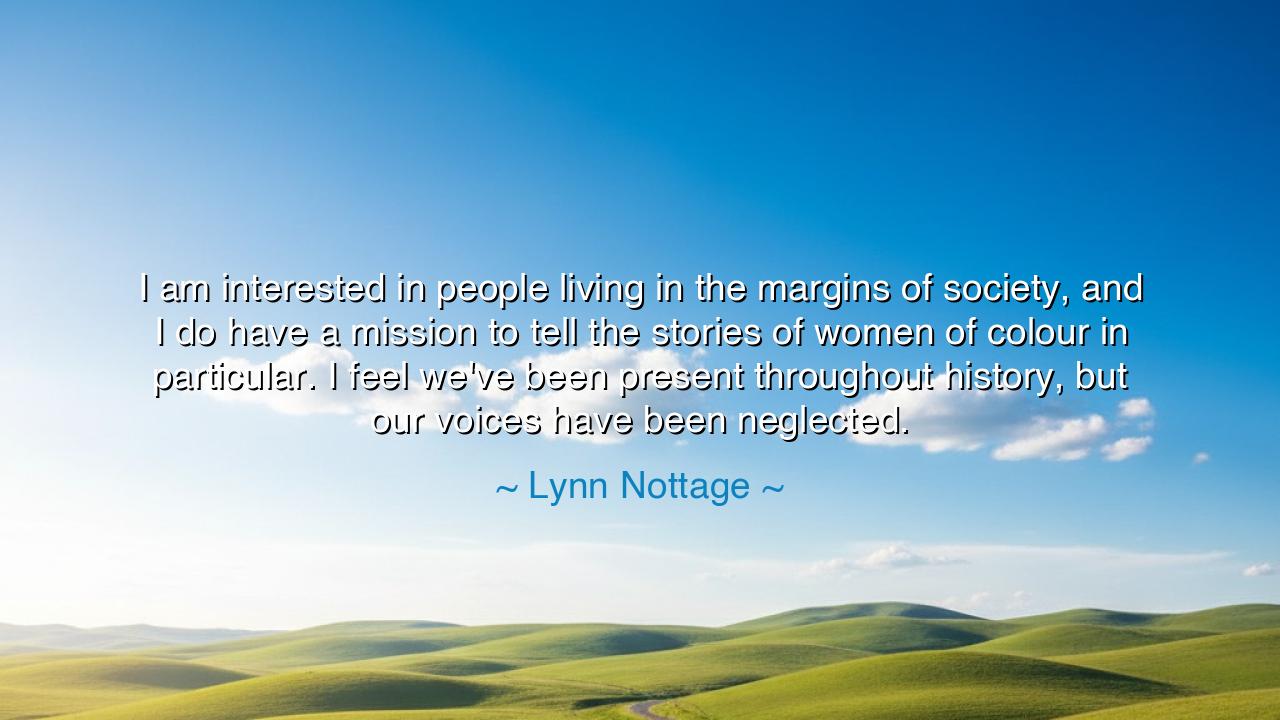
I am interested in people living in the margins of society, and I
I am interested in people living in the margins of society, and I do have a mission to tell the stories of women of colour in particular. I feel we've been present throughout history, but our voices have been neglected.






The words of Lynn Nottage—“I am interested in people living in the margins of society, and I do have a mission to tell the stories of women of colour in particular. I feel we've been present throughout history, but our voices have been neglected.”—burn with the fire of remembrance and responsibility. She speaks not merely as a playwright, but as a guardian of silenced truths. Her mission is not to invent presence where none existed, but to reveal the presence long denied recognition, to bring forth the voices of those who walked alongside kings and queens, yet were forgotten in the chronicles written by others.
The ancients knew that a people without a voice become as shadows in their own land. Stories are power: they preserve memory, shape identity, and proclaim dignity. When stories are denied, a people are made invisible. Nottage stands as a herald declaring that women of colour have always been present—working, creating, resisting, enduring—but history’s scribes turned their eyes away. Her work is to break this silence, to carve their names in the stone of memory so that no generation may again pretend they were absent.
History itself testifies to this truth. Consider the life of Harriet Tubman, who not only escaped slavery but returned again and again to rescue others, guiding them through peril with unmatched courage. For years, her name was scarcely known beyond whispers, while lesser men filled the pages of history. Only later did the world begin to recognize the greatness that had always been there. Tubman is but one among countless women of colour whose heroism and endurance were neglected by official histories, yet who carried the burdens of nations on their backs.
Nottage, through her plays, lifts these hidden lives into light. Works like Ruined and Sweat give voice to women shattered by war, workers crushed by economic decline, and communities fractured by injustice. Her mission is not simply artistic—it is profoundly moral. For in restoring these stories, she restores dignity. In making the forgotten visible, she reshapes society’s understanding of itself. Art becomes not entertainment alone, but a form of justice.
This teaching is weighty: a society that neglects the voices of its women, its poor, its marginalized, is a society that sees only part of itself. To erase these voices is to erase truth itself. A nation cannot heal if it listens only to the powerful; it cannot grow if it silences those who have borne the greatest burdens. Thus, Nottage’s mission becomes a universal command: seek out the silenced, and give them voice. For only then can history become whole.
The lesson for us is clear: honor the stories of the marginalized. Seek them, amplify them, and carry them forward. When you encounter art, writing, or testimony that brings forth neglected voices, do not turn away. Share them, teach them, let them shape your understanding. In doing so, you participate in the restoration of justice, ensuring that the lives once erased are now remembered.
Practically, this means broadening the stories we read, the plays we watch, the histories we teach. It means listening to the voices of women of colour, not as tokens, but as central to the human story. It means asking in every field—science, politics, art, and history—whose voice has been silenced, and what truth is lost because of it. By seeking these answers, each of us can become, in a small way, a partner in the mission Nottage describes.
Thus, Lynn Nottage’s words endure as a call to courage and remembrance: “We’ve been present throughout history, but our voices have been neglected.” Let us then be the generation that no longer neglects, but listens. For in lifting the voices of the marginalized, we do not merely restore their dignity—we restore our own humanity, and we ensure that the story of civilization is written not as half a tale, but as the full chorus of all its people.






AAdministratorAdministrator
Welcome, honored guests. Please leave a comment, we will respond soon